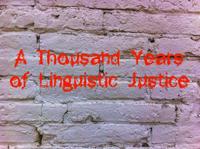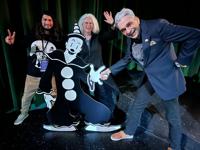
Rosalía’s recent release has garnered a stir. Among the many flows she fuses, language stands out. Articles and commentaries incessantly refer to her use of Spanglish and often judgment runs between the lines: “She speaks with an indecipherable accent, a scramble of Spanish, Catalan, Andalusian and Caribbean, sprinkled with words in English. So, happens in her songs: Someone tells her that it is hard to understand her lyrics and she laughs,” according to the Argentine newspaper, El Clarín. Rosalía has a history of even upsetting Catalonian purists with her “Spanishisms” as for some using “cumpleanys” (a word modeled after Spanish cumpleaños with Catalan morphology) instead of the canonical “aniversari” can be hard to forgive.
Like Rosalía´s contestation of rigid genres, the use of Spanglish has always caused controversy, most of all inside the Latino community inside and outside the U.S. Think Gloria Anzaldúa´s transgression in “The Borderlands” and the rebelling against the “taming of a wild tongue.”
Borders are to a great extent in our minds. What an uproar followed Ilan Stavans profanation of the sacrosanct Quijote when “translated” (for lack of a fitting word) or, rather, “amplified” into Spanglish. The work is said to reenvision “la masterpiece de Cervantes en ways que son a la vez faithfules y whimsicamente irreverentes.”
Transgressions like these are never just about language, but also unequivocally about the sense of collective identity of the speaking community. Today in educational linguistics we talk about translanguaging (of which Spanglish is just an example), as the natural way of being of bilinguals, who dynamically create language when two or more languages come into contact.
Who's to say what is allowed or not? On what authority do remote Academias of the Spanish language rule what you and I say? To restate the point, it is not just language and it never was. Just like we often argue about the artificiality of national borders, translanguaging is a subversive contestation of the rigid demarcations of national languages.
Let's cherish the creative flow and fusion our community’s language. Language is never just about language alone: language and identity build one another. Often public reactions put the spotlight on sensitive aspects of Latinidad and its language practices and transpire our tension inside.
The Academias serve their purpose in fixing rules and compiling words to establish a canon and we, Spanish speakers, may often act as extensions of their tentacular grammatical rule. Anzaldúa wrote “Even our own people, other Spanish speakers nos quieren poner candados en la boca. They would hold us back with their bag of reglas de academia.”
The Real Academia Española motto aims at fijar, pulir y dar esplendor (fixate, polish, and endow splendor) to the language, and sometimes we can take this a little too much to heart as grammar nazis or vocabulary inquisitors.
I was born in Spain, received my first degree in languages at the University of Córdoba, served as a K-12 public school bilingual educator in Oakland, California, and came to become a doctor in education at Stanford. I remember my diatribes with first graders: la radio o el radio?
Now, after 17 years in the country, I teach at San José State University and I do proudly translanguage in my teaching. I navigate registers in English, Spanish and whatever there is in between. I express in Spanglish ideas that have intellectual merits per se, or so I would like to believe. What I am certain of is that, because of my academic privilege and my European origins, nobody deems my translanguage as the confirmation that I cannot speak neither English nor Spanish. Confirmación de que soy un “ni ni.” My listeners may find my “accented” translanguage colorful, but never evidence that I am missing academic vocabulary. That is my privilege. Why should it be mine alone?
For so long the U.S. has taken pride in its monolingualism, and deemed multilingualism an infection from across its artificially imposed borders. These days parents are rushing to participate in lotteries to get their children in Dual Immersion schools where both English and Spanish are the vehicle of instruction, in measured and quantified dosage. Kinder may teach 90% of Spanish and 10% of English in decreasing proportions until reaching 50% each.
The Dual Language Immersion furor bodes like the beginning of a new liberatory era. But are we sure about this? Is there room for Spanglish?
That is the question of a spiraling controversy in educational circles, all positions equally concerned with promoting sustainable multilingualism. On the one hand, “language separators” want to preserve the minority language Spanish pure from “extranjerismos” and separate from an omnivorous English. On the other hand, translanguaging scholars advocate for a language flow in schools that resembles and honors the actual language practices of the minoritized students. Honoring them means appreciating, embracing their home cultures, as opposed to imposing language models that do not even exist in a laboratory but in projections of nationalist, colonial ideals. After all, as Noam Chomsky once rhetorically put it with regards to English, “What do they mean when people say that they want English to be pure? What are they talking about? Was Shakespeare pure?”
In a variety of fields, from law to applied linguistics, the concept of “linguistic justice” has gained traction recently and has a bearing in translanguaging as an intersectional identity issue. When it comes to educational linguistics, linguistic justice entails promoting languages endangered due to coercive monolingual laws or racial prejudices in school settings. However, we must not forget, what we promote is not what is fossilized and scripted in a grammar book or dictionary, but an ecology of languages with living beings in it. This justice is for the speaking selves of children, flowing unpredictably as they learn, without the stigma of incompleteness or faultiness. What does it mean to be linguistically just with translanguagers? We have a moral imperative to acknowledge the dignity and integrity of every speaker in their language choices without imposing on them our grammatical selves. Translanguaging must be cherished as a creative asset over the colonizing assumption of linguistic incompetence.
For lovers of Oxford-comma-style tug-of-war, translanguaging is an ideological challenge. Undeniably, there is an argument to be made when it comes to cultivating the cultural project of Spanish as a world language in relation to the other major languages in the world. In the U.S., English monolingualism is the vehicle to many other forms of discrimination and accents (read not looking white, as Flores and Rosa would remind us in their questioning of a coloblind linguistic appropriateness) are an excuse to discriminate. Some see translanguaging as a premonitory caving in to English and react accordingly. Others see in translanguaging a sort of “anything goes” in schools, and assume (erroneously) that it leads to understimulating children in the development of their competence in English or Spanish as world languages.
Translanguaging is about harnessing the linguistic power that students bring to develop performances in all languages, as they are able to read context and determine what tools in their linguistic toolbox are required for each situation. It is subversive because it questions the cataloging boxes that we have inherited over the centuries.
Allow me to indulge in a final confession: I am not a big fan of Rosalía. However, what she speaks, in all justice, is beautiful. When Spanish “was born” around the 11th century and inscribed in sagas-cantares de gesta such asCantar de mio Cid, most likely there were a few monks advocating for the preservation of Latin and horrified by nascent Castilian as a bastardized vulgar (from vulgus, -i, of the people) language. However, they could not stop the people, any more than dams can hold the ebb and flow of the sea, or stopwatches stop the course of time. As we see translanguaging unfold and flow, will we be the monks of the XXI century?














(0) comments
Welcome to the discussion.
Log In
Keep it Clean. Please avoid obscene, vulgar, lewd, racist or sexually-oriented language.
PLEASE TURN OFF YOUR CAPS LOCK.
Don't Threaten. Threats of harming another person will not be tolerated.
Be Truthful. Don't knowingly lie about anyone or anything.
Be Nice. No racism, sexism or any sort of -ism that is degrading to another person.
Be Proactive. Use the 'Report' link on each comment to let us know of abusive posts.
Share with Us. We'd love to hear eyewitness accounts, the history behind an article.